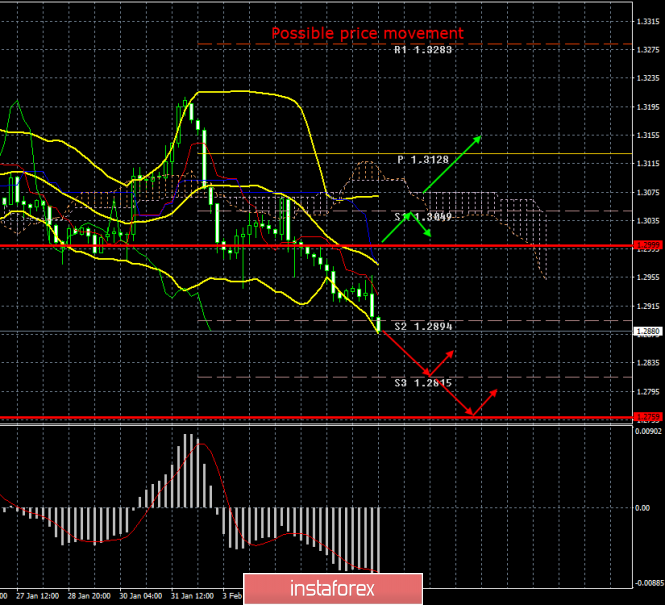4 hour time-frame

Amplitude of the last 5 days (high-low): 217p - 106p - 114p - 79p - 80p.
Average volatility over the past 5 days: 120p (high).
The pound, which has been somewhat afloat over the past few months against the US currency, continued to decline on Friday, February 7, and seems to have finally returned to a downward trend. Actually, we talked about this in recent months almost every day. The British currency has no reason for growth. The optimistic state in which traders were for several months before the parliamentary elections in the UK last year cannot be called justified. Yes, Boris Johnson's party won and yes, Brexit went to the final stage, which would not have happened if, for example, the Labor Party had won. But what has changed for the UK economy in connection with the victory of the conservatives? Nothing. What has changed for the British economy from that the country has finally stepped into the "transition period" and will now officially leave the EU in 11 months? Nothing. The country, as it lost business, companies, money in connection with this process, which began three and a half years ago, continues to do so. If the US and EU economies are affected by trade wars, the slowdown in global economic growth, and possibly the "coronavirus" in the near future, then Britain will be affected by the same factors and Brexit. As a result, the euro against the dollar continues to fall in price in "equal conditions". Now, what to expect from the pound, which has at least one reason to become cheaper? It is still unknown. Moreover, many analysts and experts believe that the pound is too cheap, that is, in other words, it is oversold. We believe that the pound is now overbought, since it significantly and unreasonably rose in price at the end of last year, which can no longer mean that it is oversold. Thus, in any case, the British currency will continue to become cheaper in the long run.
Do not forget about such a factor as trade negotiations with the European Union and the States on free trade agreements will be concluded by Boris Johnson in 2021. The chances of this were initially few. Now, when Bloc and the Kingdom began to slowly comment on this matter, it became clear that the chances were not only not growing, but also diminishing. At the same time, there is already a lot of disagreement between Brussels and London. Boris Johnson wants a deal "the same as with Canada or Australia," with which negotiations were held for 7-8 years, for 11 months. The British Prime Minister only wants a negotiation, not a comprehensive one. The European Union wants to tie Britain to itself as much as possible, wants London to guarantee fair competition between European and British companies, and wants the UK adheres to European standards and norms in the areas of labor protection, the environment and government subsidies. In addition, Brussels also wants the European Court to be the highest court in resolving all disputed issues between the Alliance and Britain. As you can see, the negotiations have not even begun, and there are already so many disagreements that they are unlikely to be resolved in 10 months. 10 months because official negotiations will begin only in March. It should also be noted the lines once and the position of Boris Johnson himself, who has already stated that London will easily exit any negotiations if it does not get the agreement it wants. That is, Johnson is easily ready to return his country to the "tough" Brexit, which the Parliament has carefully blocked in recent years. We said right after Johnson's victory in the December election that it's very bad, when all the power in the country is concentrated in the hands of one person. In these conditions, opposition forces cannot block any Johnson's decision and cannot impose their proposals on him.
We have also said that the optimism regarding a trade agreement between the United States and Britain is also not justified at this time. The fact that Donald Trump promised Johnson a "huge trade agreement" does not mean anything. We all know how the American president likes to give and take his words back. Therefore, there can be even more obstacles than in the case of Brussels when it comes to formal negotiations. Meanwhile, certain disagreements are already beginning to arise between the US and UK. For example, Trump criticized "his friend" because Johnson allowed the Chinese company Huawei to develop 5G networks in the UK. Trump had previously tried to convince Johnson not to partner with a Chinese company, but Johnson dared to disobey.
From a technical point of view, the British pound continues to decline and overcame the second support level of 1.2894. There is no signal of the start of correction at the moment. It may start on Monday, but before receiving correction signals, closing short positions is not recommended.
Trading recommendations:
The GBP/USD pair continues to move down. Thus, sales of the British pound with a target support level of 1.2815 remain relevant today. On the other hand, purchases of a pair by small lots can be considered if the price returns to the area above the Kijun-sen line with the first targets 1.13049 and Senkou Span B. line.
Explanation of the illustration:
Ichimoku indicator:
Tenkan-sen is the red line.
Kijun-sen is the blue line.
Senkou Span A - light brown dotted line.
Senkou Span B - light purple dashed line.
Chikou Span - green line.
Bollinger Bands Indicator:
3 yellow lines.
MACD indicator:
Red line and bar graph with white bars in the indicators window.
Support / Resistance Classic Levels:
Red and gray dashed lines with price symbols.
Pivot Level:
Yellow solid line.
Volatility Support / Resistance Levels:
Gray dotted lines without price designations.
Possible price movements:
Red and green arrows.
The material has been provided by InstaForex Company - www.instaforex.com